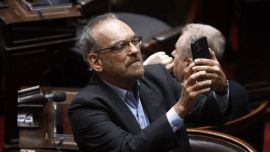The political crisis sparked by the unexpected and tough defeat of the ruling Frente de Todos coalition in last September’s PASO primaries has added fuel to the fire of heightened uncertainty that Argentina has become accustomed to.
Despite an accelerated loss of authority, President Alberto Fernández’s relationship with Cristina Fernández de Kirchner, the vice-president and real factotum of power within the Peronist front, remains a key sticking point, as is her predisposition to assume the political costs of an agreement with the International Monetary Fund and its subsequent economic plan which will undoubtedly include tough austerity measures. Cristina, who fancies herself a living myth in Argentine politics, is forced to deal with the petty issues of mortals that her handpicked delegate was incapable of resolving. Yet, it is also Fernández de Kirchner and her loyal supporters who’ve questioned the path of the government’s economic plan to the point where the authority of Economy Minister Martín Guzmán has been decimated. He is now seen as a “Debt Secretary” with the task of completing sovereign debt negotiations with the IMF before he’ll be released back into the wild of the academic world. This is the context in which the Argentine electorate faces the ballot boxes, with an opposition that didn’t bother with campaigning after the primaries, waiting for the Fernández-Fernández administration to slip on its own unforced errors.
Whatever the outcome of the midterm elections, the Frente de Todos will have come out wounded, while the opposition coalition, Juntos, is already setting its sights on a return to the Casa Rosada in 2023. All of this, of course, as the black market peso-dollar exchange rate spirals out of control and inflation remains steadily on track to remain above 50 percent on an annualised rate for months to come. Once the dust settles, Argentina will find itself deeper in the rabbit hole it has lived in for nearly a century and with even less margin than it had in the past. Poverty has spiked as wages have sunk well below inflation for quite some time while polls indicate people’s expectations for the future have tanked.
Since the primaries, it’s all been about the pan-Peronist governing coalition. Cristina sparked an institutional crisis by threatening to pull support, ordering “her” ministers to tender their resignations. For a few hours, it seemed Alberto had been empowered, giving him leverage over his political leader that could’ve left her out in the cold, and his team in charge of the government. But it was not so, he reached an understanding with his vice-president and accepted every single one of her demands in exchange for nothing, losing whatever was left of his personal and presidential credibility. A Cabinet shake up that sought a return to the traditional power bases of the Peronist party brought governor Juan Manzur from Tucumán to Buenos Aires to become Cabinet Chief in order to jumpstart the administration. Guzmán, whose head had been on the chopping block for months after mounting pressure from Kirchnerist think-tank Instituto Patria, was pardoned, but told to keep up with his promised deficit spending. The “Plan platita,” or “putting money in people’s pockets” was set in motion. City Mayor Horacio Rodríguez Larreta, the current leader of the opposition coalition, looked on as the slow motion train wreck continued before his eyes.
If the results of the PASO primaries are translated to the actual elections, the Frente de Todos would suffer a humiliating defeat both at the national level and in the all-important Buenos Aires Province, the “mother of all battles.” Mrs. Fernández de Kirchner would see her party lose its control of the Senate for the first time since the return of democracy, while the pan-Peronist front would lose its capacity to build majorities in the Chamber of Deputies, severely weakening its negotiating power with two years left in office.
This could force both coalitions, which have fed on deep-seated polarisation in order to reap electoral gains, to negotiate to get things done, including a potential IMF deal which would require Congressional approval. Are our political leaders ready for the oft-mentioned “pact” that would help the nation break out of the gridlock of “la grieta,” our national brand of polarisation? Rodríguez Larreta appears ready, while Alberto Fernández used to claim dialogue was the only way forward. Lower House Speaker Sergio Massa — whose been suspiciously absent during the rockiest days for the governing coalition he is a key member of — has put together a “plan” with which to reach a deal with Juntos. Will Mauricio Macri and the more radicalised members of the opposition coalition negotiate with a weakened Peronism? Will Cristina accept a deal with Macri and the anti-Kirchnerites?
A deal with the IMF is inevitable at this juncture, unless the Fernández –Fernández tandem reckons a default is the better option. That negotiation must be finalised by March, and the devalued duo of Alberto Fernández and Minister Guzmán have said it is their government’s intention to do so. Will the Kirchnerites take the heat for imposing harsh austerity on an embattled population, particularly when the 2023 election opens a major door of opportunity for the opposition? And thinking about 2023, which candidates will reduce the possibility of a landslide victory for Rodríguez Larreta?
This last point is important, as it is evident that the Buenos Aires City mayor sees himself as Juntos’ candidate for 2023. Within his own coalition, which deserves praise for remaining united even after Macri’s defeat, there are several contenders, starting with the former president himself. PRO party president Patricia Bullrich and neurosurgeon and Radical Civic Union (UCR) hopeful Facundo Manes have also thrown their hat in the ring. And others could emerge. Will tension between hawks and doves be the defining characteristic of Juntos going forward?
All of these are open-ended questions that will begin to play out on Monday. Good luck tomorrow!



















Comments